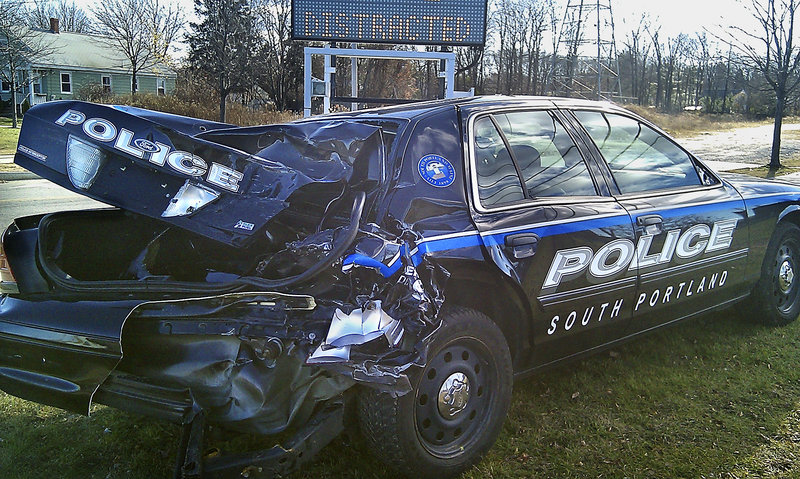SOUTH PORTLAND – The city’s police department has placed the crumpled wreckage of a cruiser at the busy corner where the Casco Bay Bridge meets Broadway to send a message to motorists: Don’t drive distracted.
The cruiser was wrecked, and an officer was injured, in a crash on the bridge on Nov. 1. Police say the driver who hit the parked cruiser with a pickup truck, David Zografos of South Portland, was talking on his cell phone.
Zografos, who was uninjured, was charged with failing to maintain control of a motor vehicle.
Now, the department is taking steps to keep officers from doing what they tell the public not to do.
South Portland police will be officially “hands free” on Jan. 1, when a new policy takes effect barring officers from holding their cell phones to their ears.
“We are trying very hard to practice what we preach,” said Police Chief Ed Googins, who is having patrol cruisers equipped with devices that enable officers to talk on cell phones without holding them.
Even before the crash on the Casco Bay Bridge, Googins was outfitting cruisers with Parrot hands-free car kits, devices that use Bluetooth technology so officers can communicate on their cell phones through a speaker in the cruisers.
Answering, dialing and checking voice mail can be done with voice commands, so there is no need for an officer to even hold the phone.
The devices cost about $200 each and are being installed in each car that’s used for patrols.
While some research suggests that even hands-free cell phone conversations can be distracting, Goggins said the reality of an officer’s job requires using a broad range of communications.
But as technology multiplies potential distractions for all drivers, allowing them to surf the Web and check e-mail while on the road, police aren’t immune from the lure of multi-tasking.
Patrick Fleming, chief of the Maine State Police, issued a policy last week covering troopers’ mobile data terminals, the laptop computers installed in the cruisers. The new policy requires the terminal to be closed whenever a cruiser is moving.
“The MDTs can certainly be a distraction,” Fleming said. “We’re trying to set an example by not having those open while troopers are operating their cruiser.”
Police say the proliferation of technology has improved communications.
State police Lt. Walter Grzyb remembers how, not many years ago, he had to find a pay phone to call a victim or a witness from the road.
“One of the most important things you had to do is know where every pay phone in your patrol area was,” he said.
Now, officers use radios, cell phones and instant-messaging on the data terminals. Each has its strength.
The radio remains the backbone of police communications. It is generally reliable and keeps other officers and agencies aware of events. Fleming said his agency encourages troopers to use radios for most communications.
Cell phones are a good tool for having a two-way conversation without broadcasting it. Officers need cell phones, Fleming said, and most have hands-free setups for the cruiser.
The mobile data terminals allow officers to communicate with several people at once or one-on-one, and enable them to look up car registrations and download pictures. Instant messages and e-mails can be viewed whenever it is convenient.
At one point, state dispatchers were using the terminals to dispatch officers — so-called silent dispatching. They stopped because that precluded other officers, who might be in the area and might be able to help, from knowing what was happening.
Robert Schwartz, director of the Maine Chiefs of Police Association, who was once chief in South Portland, said he expects more chiefs might follow Googins’ lead, although he isn’t aware of any yet.
“I think it’s a great step,” Schwartz said.
He noted that legislative proposals to regulate drivers’ cell phone use have generally exempted police. “You do see police officers talking on the telephone like every other citizen today,” he said, “and anybody can have an accident.”
Staff Writer David Hench can be contacted at 791-6327 or at:
dhench@pressherald.com
Copy the Story Link
Send questions/comments to the editors.



Success. Please wait for the page to reload. If the page does not reload within 5 seconds, please refresh the page.
Enter your email and password to access comments.
Hi, to comment on stories you must . This profile is in addition to your subscription and website login.
Already have a commenting profile? .
Invalid username/password.
Please check your email to confirm and complete your registration.
Only subscribers are eligible to post comments. Please subscribe or login first for digital access. Here’s why.
Use the form below to reset your password. When you've submitted your account email, we will send an email with a reset code.